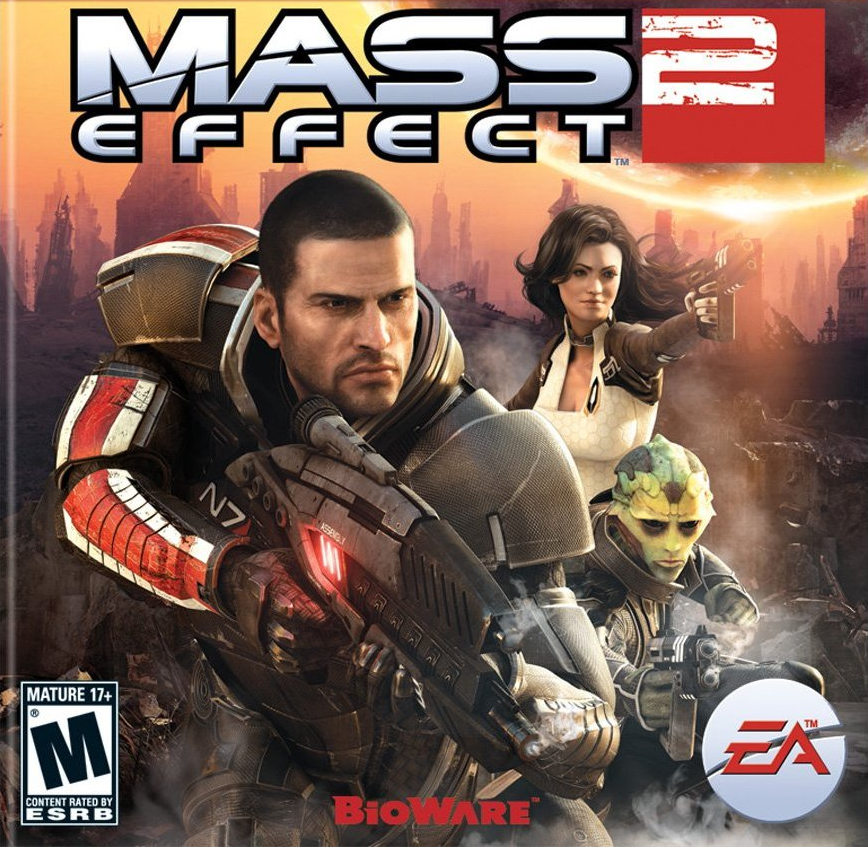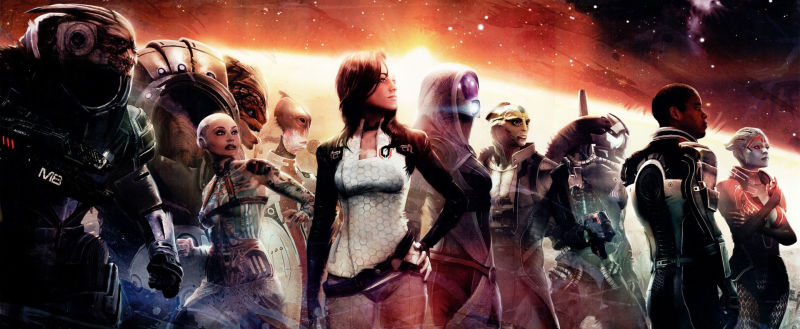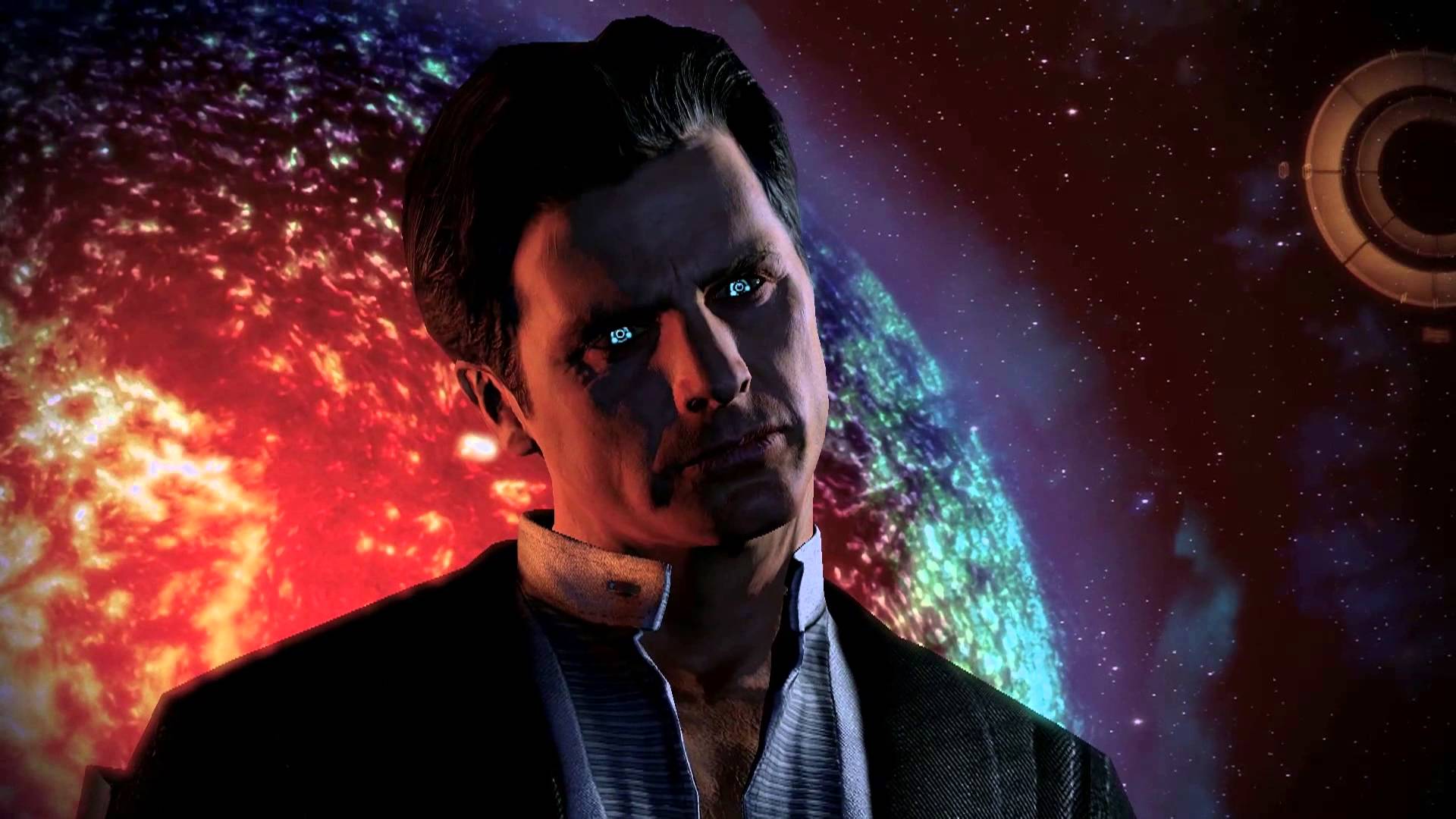
Alien: Resurrection is kind of a crappy movie, but there’s a bit of dialogue between Johner and Ripley that I absolutely love:
Johner: So, I hear you ran into these things before?
Ripley: Yeah.
Johner: What did you do?
Ripley: I died.
This bleak discourse captures the whole tone of Mass Effect 2, in which Shepard and their entire ship gets ripped apart during the game’s opening cinematic. You read that right—Shepard effing dies at the beginning of the game. Not only that, but the only reason that there’s a sequel at all is because Shepard gets resurrected by a shady group called Cerberus, which is basically Mass Effect’s version of the alt-right. Just let that sink in—the hero of the story gets killed, only to be resurrected by a group of terrible people so they can take up arms against the creatures that killed them in the first place. How can you not want to see what happens?
It’s the general consensus that if you play only one game in the original trilogy, Mass Effect 2 is your best bet. I completely agree—it’s a nearly perfect blend of sci-fi action, diverse characters, emotional storytelling and intergalactic exploration.
ME2: Suicide Squad if Suicide Squad Didn’t Suck
Like the first game, Shepard recruits teammates (some new, and some from the first game) to accompany them. Unlike the first game, Shepard is leading that team on a suicide mission through the Omega 4 Relay—a journey that no ship has survived. The combat and loot management system received a complete overhaul, effectively removing the vast majority of gripes that I had with the first game. And yes, most of the character roster is totally bangable, a dynamic that also received an influx of tension and emotion.
The first half of the game feels like an intergalactic version of Ocean’s 11—Shepard spends a good chunk of time zipping around the galaxy to recruit a team that is crazy enough to plunge headlong into the abyss. Also like Ocean’s 11, it’s very easy to fall in love with every member of Shepard’s crew. In order to get the most desirable ending, you’ve got to join each individual crew member on what’s called a “loyalty mission,” which essentially helps the crew come to the conclusion that Shepard is someone that they can follow into certain death. Not only are these missions crucial to a perfect ending, they’re damn fun to play. Each mission gives the player a personal look at the events that made your team who they are, and they’re written with the hard-hitting punch of an episode of True Detective.

Adult-centered storytelling like this makes romantic encounters in Mass Effect feel very at home within the narrative. Up until this point, I’ve probably made it sound like romance and sex in Mass Effect is purely tawdry and cosmetic, but the ability to shoop with one or more characters actually adds a lot of nuance to the game’s story. The options for male same-sex romances weren’t as inclusive as they became in the later Dragon Age games, so take that as you will, but it was surprising how organic each different relationship felt. I credit this to the game’s stellar writing and voice acting, which made any and all of Shepard’s romantic pursuits feel like natural extensions of the story.
One of the most powerful uses of this narrative-driving sexual content comes from a character named Jack. She’s your basic emotionally damaged telekinetic woman with a history of violence, and she’s not a huge fan of being fully clothed—when we first meet her, she’s wearing prison pants and a few strategically-placed straps. At first, it’s easy to write her character design off as some pervy, behind-the-scenes machinations, but the more Shepard talks with her, the more we see that her character is perfectly visualized. Jack is a badass, self-empowered woman who just happens to be into casual sex—but if the player succumbs to Jack’s initial sexual advances, she ends up resenting them for it later on. However, if the player sees through the fact that Jack uses sex as a way to cope with her own personal issues, the two can actually pursue a more meaningful relationship.
Oh, and it’s also possible for Shepard to get straight up murdered by banging a character named Morinth, who is essentially an Asari sex vampire. So, there’s something for all audiences, really.
Outside of romantic relationships, the wary professional relationship that Shepard has with the Illusive Man (voiced by Martin Sheen, no less!) is a fascinating exploration of moral ambiguity. The Illusive Man leads the extremist human rights group Cerberus. Shepard’s motivations for helping Cerberus stem from the fact that they’re the group that salvaged Shepard’s body and spent a fortune bringing it back to life. As the game progresses, it becomes easier to interpret Cerberus as the one organization in the galaxy that actually believes in the Reaper invasion, but it doesn’t change their history or reputation.

The alt-right comparison comes from the fact that Cerberus maintains a xenophobic ideology toward other alien races, but I also think Mass Effect 2 helps shed some light on why people choose to walk that path. Granted, I think that today’s alt-right largely consists of garbage humans, but working with garbage humans in Mass Effect 2 kind of lets the player step back and focus on the human part of that equation. And, as we’ll see after delving into Mass Effect 3, xenophobic ideologies tend to result in self-destruction.
Next week: Mass Effect 3, racial tension, and the dangers of geek entitlement (that ending tho!).